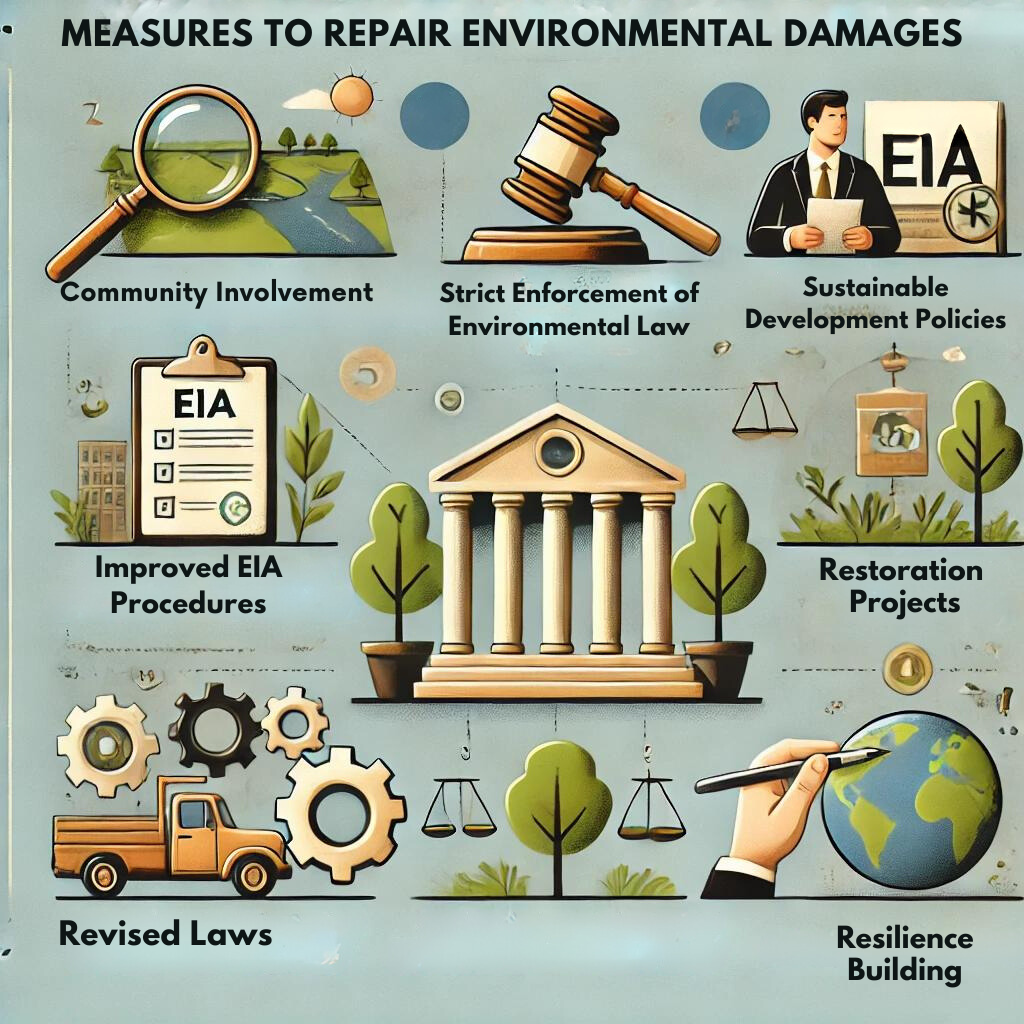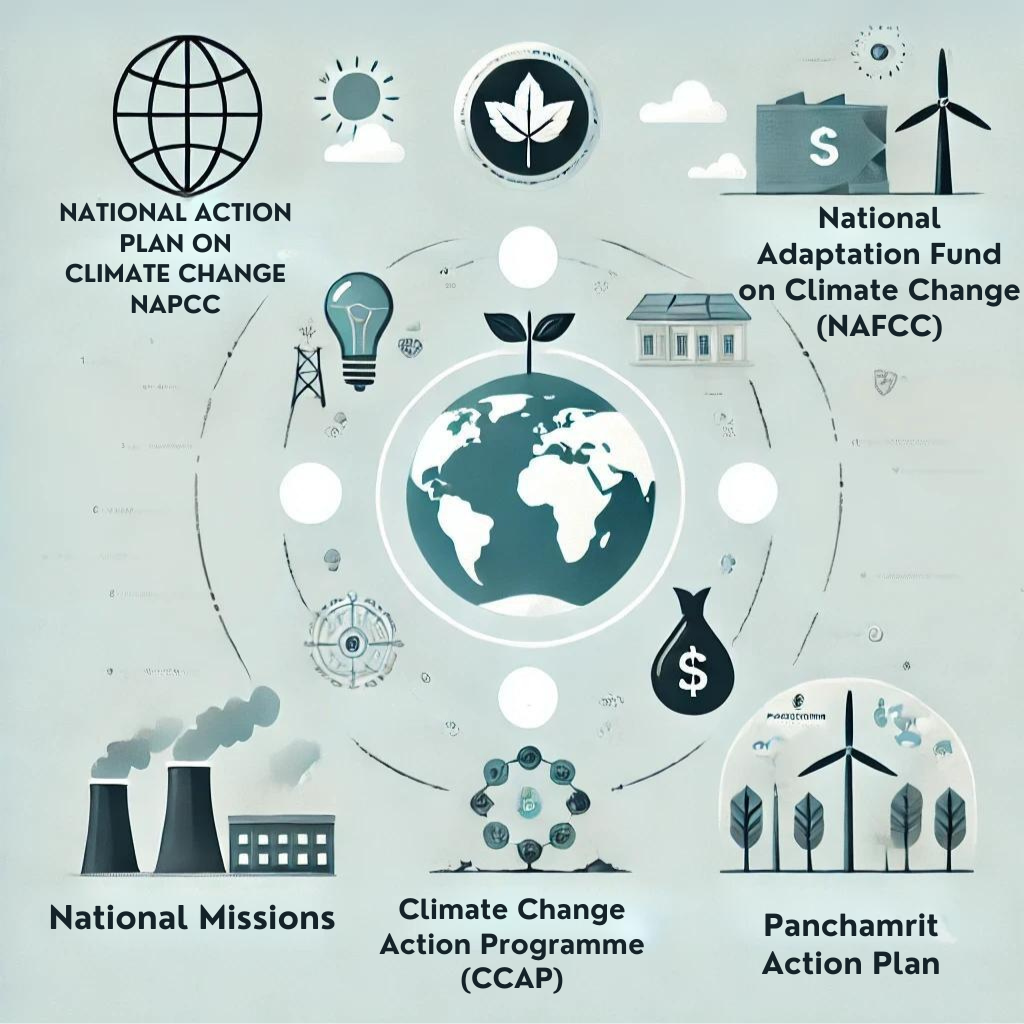The new government at the Centre and Lok Sabha must address India’s pressing environmental challenges. Historically, Indian governments have prioritized development over environmental protection, often neglecting green interests. Although recent administrations have focused on industries like mining and power, environmental concerns have been sidelined. India now faces significant environmental issues that demand immediate attention and the integration of sustainable practices into its growth strategy to prevent further degradation.
Origin of the Article
This editorial is based on “Create the space for governance with a green heart,” published in The Hindu on June 24, 2024. The article discusses the urgent need for the new government to prioritize environmental issues.
Relevancy for UPSC Students
For UPSC students, understanding this topic is crucial. It aligns with GS Paper 2, covering environmental pollution, climate change, and its impacts. Knowledge of this topic will help in answering questions related to environmental governance and sustainable development, which are important for both the prelims and mains exams.

Why in News
The topic is crucial for UPSC aspirants as it addresses the pressing need for the new government to prioritize environmental challenges, a recurrent theme in General Studies Paper 2. Previous UPSC exams have frequently included questions on environmental governance, climate change impacts, and sustainable development policies. Understanding the current context helps aspirants frame nuanced answers in line with contemporary issues.
Lack of Political Will on Environmental Governance
India’s environmental policy has historically suffered from a lack of political will, leading to a growing ecological crisis. Governments have favored rapid industrial and economic development, often at the expense of environmental protection. This neglect has resulted in significant environmental degradation, highlighting the urgent need for political commitment to address these pressing issues.
Climate Change Mitigation and Adaptation
India’s efforts to combat climate change are inadequate, particularly in reducing carbon emissions and developing adaptation strategies. The country faces a significant gap in ensuring food security and preparedness for natural disasters, both of which are exacerbated by global warming. Effective climate change mitigation and adaptation strategies are critical to securing a sustainable future.
Diminishing Forest Cover
The loss of forest cover in India is alarming. Recent legislative changes have weakened ecosystem protections, leading to both quantitative and qualitative degradation of forests. This has resulted in increased environmental damage, underscoring the need for stronger legislative measures to protect these vital ecosystems from further harm.
Urban Environment
Urban areas in India are grappling with severe air pollution, water scarcity, and inadequate sewage treatment. These issues have dire consequences for public health and lead to the pollution of rivers and other water bodies. Addressing these urban environmental challenges is crucial for improving the quality of life for millions of people.
Climate Change Impacts in the Himalayas
The Himalayan region faces acute environmental challenges, including glacier melting and altered weather patterns. These changes threaten the region’s water supply and food security. The government’s lack of action in response to local environmental protests highlights a disconnect between national policy and grassroots needs, necessitating immediate and targeted interventions.
Lacunae in the EIA Process
The Environmental Impact Assessment (EIA) process in India has notable shortcomings. Reduced rigor and lack of stakeholder engagement have compromised its effectiveness in preventing environmentally harmful projects. Strengthening EIA regulations and ensuring meaningful stakeholder participation are essential steps toward better environmental protection.
Measures to Repair Environmental Damages
Effective strategies are essential for addressing and repairing environmental damage. Emphasizing sustainable practices and involving communities in decision-making processes can lead to more resilient and ecologically balanced development.

Improved EIA Procedures
Enhancing EIA mechanisms is crucial to preventing environmental harm. This involves making the procedures thorough, transparent, and mandatory. Ensuring rigorous assessments and stakeholder engagement can significantly mitigate the adverse impacts of development projects.
Restoration Projects
Large-scale conservation and restoration efforts targeting glaciers, forests, and rivers, particularly in the Himalayas, are vital. Such projects can help restore ecological balance and mitigate the adverse effects of environmental degradation, ensuring the sustainability of these critical natural resources.
Community Involvement
Involving local communities and stakeholders in environmental policy decision-making is essential. Their participation ensures that policies reflect ground realities and local knowledge, leading to more effective and inclusive environmental governance.
Strict Enforcement of Environmental Law
Improving the enforcement of environmental standards and imposing enhanced penalties for violations can discourage harmful activities. Stronger enforcement mechanisms are necessary to ensure compliance and protect the environment from further degradation.
Sustainable Development Policies
Creating and implementing policies that balance development with environmental conservation is crucial. Sustainable development policies promote long-term resilience and ecological health, ensuring that economic growth does not come at the cost of environmental sustainability.
Revised Laws
Revising laws like the Forest (Conservation) Amendment Bill, 2023, is necessary to provide stronger protections for natural ecosystems. Legislative revisions should aim at strengthening legal frameworks to safeguard the environment effectively.
Resilience Building
Investing in infrastructure and programs that enhance resilience to climate change impacts is essential. This includes better water management systems and disaster preparedness strategies, which can mitigate the adverse effects of climate change and ensure community resilience.
Steps Taken by Government in this Regard
The Indian Government has initiated several schemes to combat climate change and promote environmental sustainability. These steps are crucial in mitigating adverse environmental impacts and fostering a sustainable future.

National Action Plan on Climate Change (NAPCC)
Launched in 2008, the NAPCC outlines eight National Missions focusing on climate change understanding, adaptation, mitigation, energy efficiency, and natural resource conservation. This comprehensive plan aims to address the multifaceted challenges posed by climate change.
National Missions
The eight National Missions under the NAPCC include the National Solar Mission, National Mission for Enhanced Energy Efficiency, National Mission on Sustainable Habitat, National Water Mission, National Mission for Sustaining the Himalayan Ecosystem, National Mission for a Green India, National Mission for Sustainable Agriculture, and National Mission on Strategic Knowledge for Climate Change.
National Adaptation Fund on Climate Change (NAFCC)
The NAFCC supports projects aimed at climate change adaptation. By funding initiatives that enhance climate resilience, the NAFCC plays a critical role in helping communities adapt to the changing climate and mitigate its adverse impacts.
Climate Change Action Programme (CCAP)
The CCAP aims to build capacity at the state level to address climate change. It supports the implementation of State Action Plans on Climate Change, fostering localized responses and enhancing state-level preparedness and resilience.
Panchamrit Action Plan
The Panchamrit Action Plan sets ambitious targets, including achieving 500 GW of non-fossil fuel energy capacity by 2030, fulfilling half of the energy requirements through renewable sources, reducing CO2 emissions by 1 billion tons, lowering carbon intensity by 45%, and achieving Net-Zero emissions by 2070. These targets reflect India’s commitment to a sustainable and low-carbon future.
PESTEL Analysis
| Political: The editorial criticizes the lack of emphasis on environmental issues in political agendas, particularly in election manifestos. It calls for the new government to reorient policies toward sustainable development, suggesting a political will to integrate environmental protection with development strategies. Economic: The economic implications are significant as the editorial suggests that ignoring environmental concerns can hinder sustainable growth. It emphasizes the need for investments in resilient infrastructure and sustainable industries, which could foster economic stability by mitigating the impacts of climate change. Social: The editorial highlights the social consequences of environmental neglect, such as health issues arising from air pollution and water scarcity. It advocates for community involvement in environmental decision-making, which could enhance social cohesion and public trust in governmental actions. Technological: There is a call for improving Environmental Impact Assessment (EIA) procedures and adopting advanced technologies for better disaster preparedness and resource management, suggesting a gap in current technological applications for environmental management. Environmental: The core focus of the editorial is on various environmental challenges—climate change, deforestation, urban pollution, and impacts on the Himalayan ecosystem. It argues for a comprehensive approach to addressing these issues through laws, conservation efforts, and enforcing environmental standards. Legal: The editorial points out flaws in existing environmental laws and procedures, such as the dilution of EIA regulations. It recommends a thorough revision of laws to ensure stronger environmental protections, aligning legal frameworks with environmental sustainability goals. |
Conclusion
It was sad to see major political parties overlooking environmental issues and challenges in their election manifestos. It is still not too late, and we still have enough time to reverse the damages caused by climate change and environmental pollution. The new Indian government needs to critically assess the nation’s ecological health to genuinely fulfill its role as the guardian of its citizens. By tackling these pressing environmental challenges, we can safeguard the lives and well-being of countless individuals.
| UPSC Civil Services Examination, Previous Year Questions (PYQs) Mains Q. Urban flooding is a problem in India due to various reasons. Discuss the reasons and suggest measures to mitigate the problem. (GS-II, 2022) Q. Discuss the steps taken by the Government of India to combat climate change. (GS-II, 2022) |

